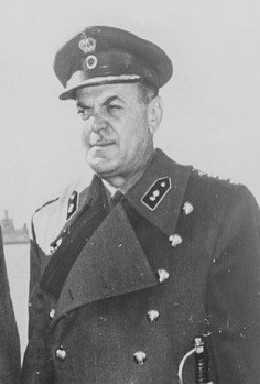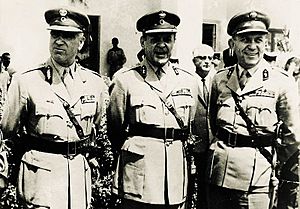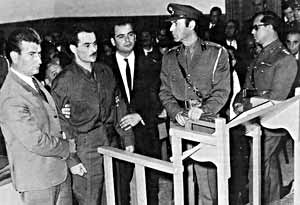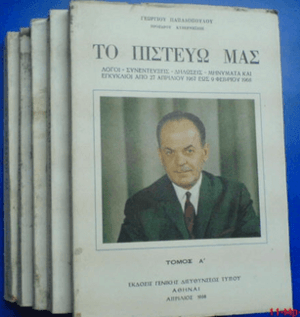Georgios Papadopoulos facts for kids
Quick facts for kids
Georgios Papadopoulos
|
|
|---|---|
| Γεώργιος Παπαδόπουλος | |
 |
|
| President of Greece | |
| In office 1 June 1973 – 25 November 1973 |
|
| Prime Minister | Himself |
| Vice President | Odysseas Angelis |
| Preceded by | Constantine II (as King of the Hellenes) |
| Succeeded by | Phaedon Gizikis |
| Prime Minister of Greece | |
| In office 13 December 1967 – 8 October 1973 |
|
| Monarch | Constantine II (until 1973) |
| President | Himself (from 1973) |
| Deputy | Stylianos Pattakos |
| Preceded by | Konstantinos Kollias |
| Succeeded by | Spyros Markezinis |
| Regent of Greece | |
| In office 21 March 1972 – 31 May 1973 |
|
| Monarch | Constantine II |
| Preceded by | General Geórgios Zoitakis |
| Succeeded by | None (monarchy abolished) (Odysseas Angelis as Vice-President of Greece) |
| Personal details | |
| Born | 5 May 1919 Elaiohori, Kingdom of Greece |
| Died | 27 June 1999 (aged 80) Athens, Greece |
| Resting place | First Cemetery of Athens |
| Political party | National Political Union (1984–1996) |
| Spouses | Niki Vasileiadi Despina Gaspari |
| Children | 3 |
| Alma mater | Hellenic Military Academy |
| Signature | |
| Military service | |
| Allegiance |
|
| Branch/service |
|
| Years of service | 1940–1973 |
| Rank | |
| Battles/wars | Second World War Greek Civil War |
Georgios Papadopoulos (born May 5, 1919 – died June 27, 1999) was a Greek military officer. He became a powerful leader, or dictator, of Greece from 1967 to 1973. This happened after a sudden takeover of the government, known as a coup.
Papadopoulos joined the Greek army during World War II. He fought against the Italian invasion in 1940 and was seen as a hero. After the war, he stayed in the army and rose to the rank of colonel.
In April 1967, Papadopoulos and other army officers took over the democratic government. They created a military government called a junta, which lasted until 1974. Papadopoulos took on a lot of power. He led a government that was very strict, against communism, and strongly promoted Greek identity. His rule eventually ended the Greek monarchy and made Greece a republic, with himself as president.
In 1973, another officer, Dimitrios Ioannidis, overthrew Papadopoulos. After democracy returned to Greece in 1974, Papadopoulos was put on trial for his actions during the junta. He was sentenced to life in prison. He stayed in prison for the rest of his life, refusing offers to be set free if he admitted he was wrong.
Contents
Early Life and Military Career
Georgios Papadopoulos was born in Elaiohori, a small village in the Achaea region of Greece. His father, Christos Papadopoulos, was a schoolteacher. Georgios was the oldest of three sons.
After finishing high school in 1937, he joined the Royal Hellenic Military Academy. He completed his training there in 1940. He also took some civil engineering classes but did not finish that degree.
World War II and Beyond
During World War II, Papadopoulos served as an artillery officer. He fought against both Italian and German forces that attacked Greece in 1941.
Some people have said that Papadopoulos was part of the "Security Battalions" during the Axis occupation of Greece. These groups were sometimes involved in fighting Greek resistance. However, other historians disagree with this idea.
After Greece was freed, Papadopoulos joined other right-wing military officers. They formed a secret nationalist group called IDEA in 1944.
After World War II
Papadopoulos continued to rise in the army. He became a captain in 1946 and a major in 1949, during the Greek Civil War. From 1959 to 1964, he worked for the KYP Intelligence Service. He was the main contact between KYP and the top CIA officer in Greece, John Fatseas. He had also trained with the CIA in 1953.
The Beloyannis Trial
In 1951, Major Papadopoulos was part of a military court that tried Nikos Beloyannis. Beloyannis was a well-known Greek communist leader. He was sentenced to death for being a member of the Communist Party, which was banned in Greece at the time. This sentence was not carried out right away.
Beloyannis was tried again in 1952 for spying. He was sentenced to death and executed. Papadopoulos was not involved in this second trial. Many Greeks felt that Beloyannis was punished for his political beliefs.
Rise to Colonel
In 1956, Papadopoulos was part of a failed attempt to overthrow King Pavlos. In 1958, he helped create a military surveillance office. This same office later played a role in the successful coup of 1967.
In 1965, Papadopoulos was in the news for arresting soldiers and civilians. He claimed they tried to damage army vehicles. It was later shown that Papadopoulos himself had damaged the vehicles. He was not removed from the army, as the Prime Minister, Georgios Papandreou, forgave him. In 1967, Papadopoulos was promoted to colonel.
The 1967 Coup

On April 21, 1967, just before general elections, Colonel Papadopoulos and other officers led a successful coup. They took advantage of a difficult political situation between the young King Constantine II and the former Prime Minister, Georgios Papandreou. Papadopoulos used his new power to put Papandreou under house arrest. He also tried to change Greek politics to be more conservative. The people involved in the coup are sometimes called Aprilianoi (Aprilians) in Greece.
The Colonels' Regime
King Constantine appointed a new government. However, Papadopoulos quickly became the most powerful person in this new government. He was made Minister of National Defense and Minister of the Presidency. His power grew even more after the King's attempt to counter the coup failed in December. Papadopoulos then became Prime Minister. In 1972, he also named himself Regent of Greece.
"Patient in a Cast"
Papadopoulos often used a strange comparison to explain his rule. He would say that Greece was like a "patient" who needed "surgery." He or the junta were the "doctors" who had to put the patient's "foot" in a cast and tie them down. This was to make sure the "patient" (Greece) was safe during the "operation."
Assassination Attempt
On August 13, 1968, Alexandros Panagoulis tried to assassinate Papadopoulos. Panagoulis set off a bomb on the road where Papadopoulos's car would pass. The bomb did not harm Papadopoulos. Panagoulis was caught later. He was sentenced to death but Papadopoulos himself pardoned him. Panagoulis served five years in prison. After democracy returned, he became a member of Parliament. He is remembered as a symbol of the fight for democracy.
Attempts at Liberalization
By 1968, Papadopoulos said he wanted to reform the government. He even tried to contact Spiros Markezinis about it. He stated that he didn't want the "Revolution of April 21" to become a permanent dictatorship. However, other strict members of the junta, like Ioannides, stopped his attempts to make the government more open in 1969 and 1970.
As people in Greece became more unhappy in the early 1970s, Papadopoulos tried to make his government seem more legitimate. He started a slow process of "democratization." On June 1, 1973, he ended the monarchy and declared Greece a republic, with himself as president. People voted in a special election to confirm him as president. He also tried to get support from older politicians, and Spiros Markezinis became Prime Minister. Many rules were relaxed, and the army's role was reduced. A new temporary constitution gave the president a lot of power. Many of Papadopoulos's supporters were unhappy with these changes, which led to problems later.
Ties to US Intelligence
It has been widely reported that Papadopoulos had some connections to the Central Intelligence Agency (CIA). He is also said to have received military and intelligence training in the United States in the 1950s.
In 1973, a newspaper article claimed the CIA helped plan the 1967 coup. It also said Papadopoulos was known as "the first CIA agent to become Premier of a European country." A CIA agent named William Colby denied these claims. He said the CIA did not plan the coup and that Papadopoulos was not a CIA agent. He added that they sometimes worked with Papadopoulos in his official role.
Later, another CIA agent, John M. Maury, wrote that the CIA was surprised by the coup. He said they did not try to influence or harm the Greek government. However, many Greeks still believe the U.S. was involved or at least knew about the dictatorship.
Divorce by Decree
Papadopoulos married his first wife, Niki Vasileiadi, in 1941. They had two children. Later, they separated. At that time, Greek law made divorce difficult without both spouses agreeing. In 1970, while he was Prime Minister, Papadopoulos created a special law that allowed him to get a divorce. This law had a strict time limit and ended automatically after he used it. After his divorce, Papadopoulos married Despina Gaspari in 1970, and they had a daughter.
Fall of Papadopoulos's Regime
After student protests at the National Technical University of Athens in November 1973, Papadopoulos's government was overthrown. Hardline army members took over on November 25, 1973. The strong reaction to Papadopoulos using the army to stop the student uprising gave Dimitrios Ioannidis a reason to remove him. Papadopoulos was placed under house arrest. Greece then returned to a more traditional military dictatorship.
When democracy was restored in 1974, Papadopoulos and his associates were arrested. They were put on trial for serious crimes against the country. In August 1975, he and others were found guilty and sentenced to life in prison. Papadopoulos remained in prison until he died on June 27, 1999, at age 80. He had been treated for cancer since 1996. He refused to accept an offer of freedom that required him to admit his guilt.
Legacy
Today, Papadopoulos is seen as a symbol of strict, authoritarian rule. Some people on the far right still praise him for promoting Greek culture and fighting against political enemies. After democracy returned, a small political party called the National Political Union (EPEN) declared him its honorary leader. This party later dissolved, and its supporters joined other groups.
See also
 In Spanish: Georgios Papadópoulos para niños
In Spanish: Georgios Papadópoulos para niños
- History of Modern Greece
- Military history of Greece during World War II
Images for kids
 | Bayard Rustin |
 | Jeannette Carter |
 | Jeremiah A. Brown |



